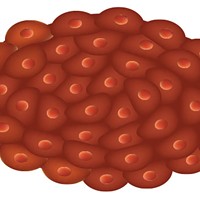Mention just about any scientific finding involving a chain of causation — anthropocentric global warming, monarch butterflies/milkweed destruction, fluoridation/fewer cavities ("Colorado Brown Stain," May 31) — and you'll hear "correlation isn't causation" from skeptics. And they're right. If you suggest A causes B, they're going to ask, "How are you so sure B doesn't cause A?" (Does high self-esteem cause kids to get high grades or the other way around?) Or, "How do you know C doesn't cause both A and B?" (Does the correlation between increased ice cream sales and more drownings mean that ice cream causes drownings, or does hot weather cause an increase in both?) In fact, it's often impossible to prove that A causes B with 100 percent certainty.
Solid Correlation-causation: Smoking and lung cancer. The poster child for causation is smoking and lung cancer. We all know that smoking is the prime cause of lung cancer. Except "all" doesn't include tobacco company lawyers, who regularly point out that (1) fewer than 10 percent of lifelong smokers will get lung cancer and (2) non-smokers also get the disease. (This probably won't convince anyone to quit so if I were a doctor, I'd turn the statistics around and tell my patients: Smoking accounts for 30 percent of all cancer deaths and 87 percent of lung cancer deaths; male smokers have 23 times the risk of developing lung cancer as non-smokers and life expectancy for tobacco smokers is 14 years less than the national average.)
How can we be sure that smoking causes lung cancer? We can't and it doesn't — not definitively. It adds to the risk, sufficiently for most of us to either quit or never start. Evidence for the increased-risk causation is solid, starting with statistical studies in the 1950s, when the American Cancer Society followed the smoking habits of 188,000 men; the ones who died of lung cancer were much more likely to have been smokers than not. Also, researchers can actually see that smoke damages epithelial cells lining the windpipe and lungs, reducing the ability of the hair-like cilia on the surface of these cells to push mucus out of the lungs (hence smoker's cough). Not to mention the several dozen carcinogenic chemicals found in tobacco smoke. And on and on.
Shaky Correlation-causation: Breakfast and obesity. WebMD is a reputable healthcare website. It's the first place many of us go when we have an odd pain or weird swelling or dizzy spell. A few years ago, WebMD published an article under the heading "Eating Breakfast May Beat Teen Obesity." The article summarized a study published in Pediatrics which analyzed the five-year diet and weight patterns of over 2,200 adolescents in Minneapolis-St. Paul, Minnesota. According to the WebMD summary, "Teens who regularly ate breakfast tended to gain less weight ... than breakfast skippers" and "regular breakfast eaters seemed more physically active than breakfast skippers."
So the article suggests that A (eating breakfast) causes B (more activity). But maybe B causes A: physical activity makes for hungry kids. Or maybe C causes both A and B, where C is physical activity which leads to both hunger for breakfast and calorie burning, which helps reduce obesity. Or (from a suggestion by science educator Sal Khan, from whom I first heard about this study) perhaps the root cause (C) of both skipping breakfast and obesity is poverty, that is, poverty results in both parents leaving the house early for work, so the kids don't get proper breakfasts and they're eating less healthily, leading to obesity. Now eating breakfast may indeed help alleviate obesity in teens. But the study as reported sure didn't make the case for causation.
To sum up: Correlation is "When A happens, B happens, and vice versa" while causality is "A causes B." Time to ask yourself: Does reading the Journal make you happy or does feeling happy make you read the Journal?
Barry Evans ([email protected]) can't decide whether he's alive because his heart beats or his heart beats because he's alive.



Comments (9)
Showing 1-9 of 9